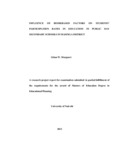| dc.contributor.author | Gitau, W. Margaret | |
| dc.date.accessioned | 2013-08-13T08:07:07Z | |
| dc.date.issued | 2013 | |
| dc.identifier.citation | A research project report for examination submitted in partial fulfillment of the requirements for the award of Masters of Education Degree in Educational Planning | en |
| dc.identifier.uri | http://erepository.uonbi.ac.ke:8080/xmlui/handle/123456789/56079 | |
| dc.description.abstract | The purpose of the study was to investigate the influence of home based factors
on students’ participation rates in public day secondary schools in Masinga
District guided by four objectives: To investigate the influence of family income,
to investigate the influence of parents level of education, to determine the
influence of parenting styles and to establish the influence of family type has on
students participation rates in public day secondary schools in Masinga District.
The study adopted a cross-sectional survey research design. Quantitative and
qualitative approaches of data collection were employed. A total of 368
respondents constituted the sample of the study;-34 head teachers, 50 parents, 75
teachers and 209 students.
The researcher used two types of research instruments: namely questionnaires and
interviews. The results revealed that there was a positive significant relationship
between the levels of family income at 93.5% parents’ level of education 31.8%,
parenting style 77.4% and family type 97% on students’ participation rates in
Masinga District.
The conclusions were that level of income led to low participation of students, the
level of education of the parents is neutral on whether a student a student
participates or not whereas the parenting style and family type relatively affects
participation of day secondary school students in Masinga District in that it may
promote or demote participation.
xv
The recommendation was that the government should increase bursaries and
efforts made to empower families in Masinga District to ensure a steady income
to these families. Non Governmental organizations should also come in give
grants and loans to groups and individual that would like to invest so as to ensure
they are capable in the provision of basic needs to their families and thus enhance
participation as most children will enroll and actively participate in education.
Increased awareness on the importance of education should be instilled on the
parents and this will ensure every parent regardless of their education level will
enroll their children in school. Proper seminars on how to raise and instill morals
on children should be availed to parents to ensure a morally upright society is
upheld.
The researcher went ahead to suggest that further study should be done on the
criteria used in disbursement of bursaries and other donor resources towards
education attainment to ensure assistance is given to genuinely deserving students
and curb any inefficiency in funds allocation. A study should also be done on the
lifestyles of the Masinga District community so as to establish the reason for
poverty and come up with a solution to the problem of low income, family breakups,
separations divorce and other home based factors that may affect families
and in turn affect students’ participation | en |
| dc.language.iso | en | en |
| dc.title | Influence of homebased factors on students’ Participation rates in education in public day Secondary schools in Masinga District | en |
| dc.type | Thesis | en |
| local.publisher | Educational Administration and Planning, University of Nairobi | en |

